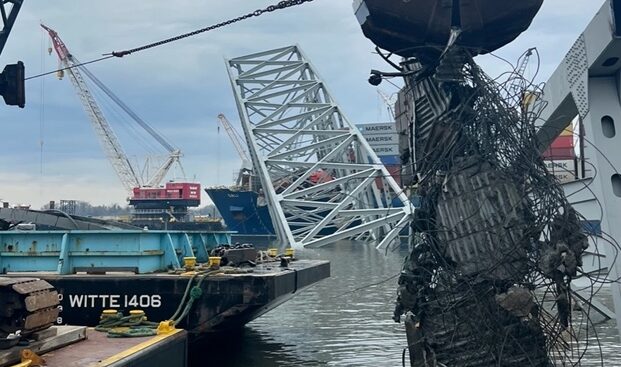Insurance pay-outs from Baltimore bridge disaster in the spotlight

Cargo insurer WK Webster is reporting that general average looks to have been declared by the owners of the wrecked Dali containership which destroyed Baltimore’s largest bridge and crippled the city’s port operations last month.
General average means all parties involved with the cargo will have to share in the cost of the salvage operations.
Ahead of what will be years of legal wrangling, the owner and manager of the Dali have sought to limit potential pay-outs from the big Baltimore bridge allision which killed six road maintenance workers.
On April 1, Singapore-based Grace Ocean and shipmanager Synergy Marine filed a limitation of liability court petition seeking to cap their liability to just $43.6m, in a case that overall is expected to see pay-outs in the billions of dollars.
Records look set to be broken in terms of shipping insurance payouts for the Dali incident.
To date, the sinking of the Costa Concordia cruiseship in 2012 and 2021’s Ever Given incident stand out as the largest casualty pay-outs this century, but early estimates are that the total costs from Tuesday’s extraordinary accident involving the 9,962 teu Dali containership could dwarf those infamous accidents.
The head of Lloyd’s of London warned last month that the Dali could prove to be the largest marine pay-out in insurance history.
At the scene of the ongoing salvage work to move the sunken bridge and damaged boxship, operations continue at pace.
“There has been incredible progress this week towards our goal to open the limited access deep draft channel,” said Colonel Estee Pinchasin, commander of the Baltimore District of the US Army Corps of Engineers yesterday. “Our amazing team of local, state, federal and community responders remain focused on the safe and efficient removal of debris and wreckage from the federal channel and waterway.”

Limitation of liability, General Average, what’s next… the Dali disaster will be a “short” course in managing Marine Insurance claims.
Rule Paramount
Rule A
1. There is a general average act when, and only when, any extraordinary sacrifice or expenditure is intentionally and reasonably made or incurred for the common safety for the purpose of preserving from peril the property involved in a common maritime adventure.
2. General average sacrifices and expenditures shall be borne by the different contributing interests on the basis hereinafter provided
Rule V – Voluntary Stranding
When a ship is intentionally run on shore for the common safety, whether or not she might have been driven on shore, the consequent loss or damage to the property involved in the common maritime adventure shall be allowed in general average. REM: was Dali stranded voluntarily ???
Rule D
Rights to contribution in general average shall not be affected, though the event which gave rise to the sacrifice or expenditure may have been due ((((((( to the fault of one of the parties )))))))) to the common maritime adventure, but (((((( this shall not prejudice any remedies or defences which may be open against or to that party in respect of such fault. )))))) Rem: CMA CMA LIBRA – seaworthiness case
SOURCE : YORK-ANTWERP RULES 2016
SOURCE : BROWNS ALMANACH
When considering the form-and manner of a sacrifice to be made, the Master has to remember that four factors are essential:
Firstly, the whole adventure must be in peril, and this peril must be extraordinary, it is not enough that the peril may arise, the peril must be actually existent. REM: does it??
Secondly, the expenditure or sacrifice intended must be deliberate, intentional and voluntary.
Thirdly, the expenditure, or sacrifice, must be reasonable in the circumstances, and must be outside the normal requirements of the “Sue and Labour Clause”.
Lastly, it must be extraordinary, and beyond the normal requirements of the charter party.
You are very right but the lawyers…..
I have no idea if I am right or not .I Just copy/pasted the content that is relevant or may be is relevant. But the lawyers…………………in America…….. 😉 . They surely have skills to clock the hrs 😉 and prove unthinkable.
The allision (US terminology not recognised in English law) with the bridge was certainly not a ‘Voluntary Stranding’. Also, suggest you and anyone interested refer to Swedish P&I Club webpage as below for a concise explanation of US law on GA and the effect of the New Jason Clause which was undoubtedly incorporated into the BLs.
https://rulesandexceptions.swedishclub.com/part-two-comments/chapter-2-risks-covered/rule-4-liabilities-in-respect-of-cargo/section-7-general-average/
Sir .
Many thanks for Your clarification.
question: Snince You have mentioned Swedish Club does it mean , that Dali H&M insurance was with them?? as that detail is not widely spread in the media , which on the other hand say that Dali P&I Club was Britannia. And what if B/L contains jurisdiction cl indicating UK jurisdiction. I am not in legal stuff , hence may get easily confused. Any chance for some clarification on that?? Please.
Rgds
That’s what insurance is for to pay off any damage claims,unless of course your dealing with sleepy Joe,like everything else he expects the taxpayers to cover all the lisses
You are very right but the lawyers…..